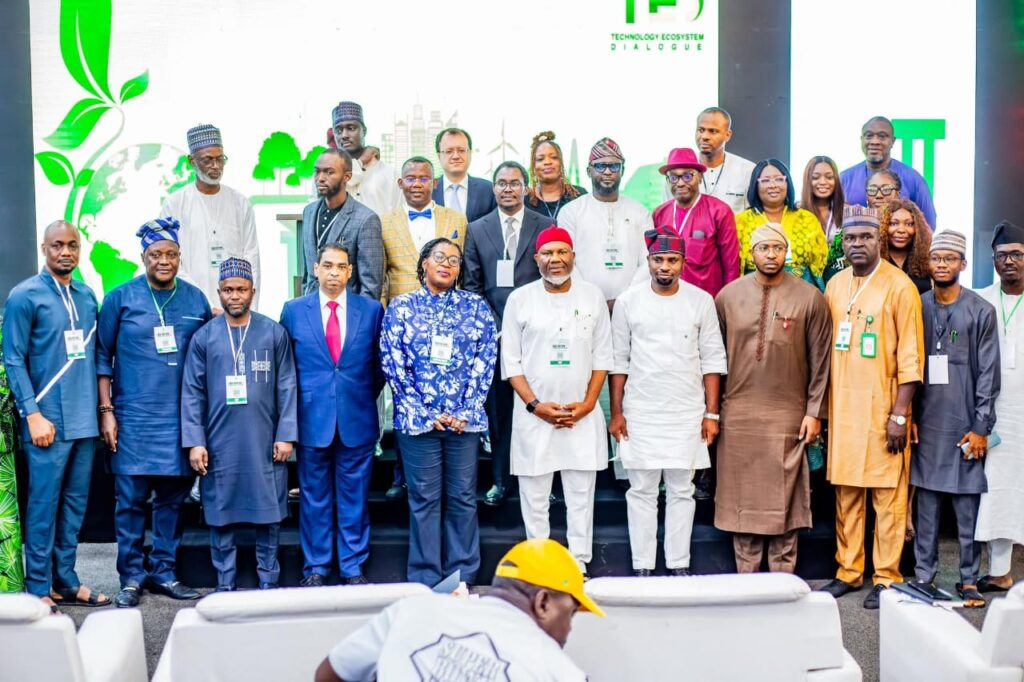In a bold move to place Nigeria at the forefront of sustainable innovation, the National Information Technology Development Agency (NITDA) has stepped up its efforts to galvanise green technology adoption across government, industry, academia and civil society. At the heart of this initiative lies the belief that Nigeria’s next phase of development must be built on clean energy, resilience, and digital transformation.
Kashifu Inuwa, the Director-General of NITDA, reiterated this conviction during the recent 3rd Technology Ecosystem Dialogue (TED 2025), themed “Green Tech and Energy Revolution: Transforming Business and Society.” He urged all stakeholders to move beyond rhetoric, emphasising that “embracing green technology is not optional but a necessity.”
With growing climate pressures and energy challenges across Nigeria, Inuwa’s message resonates with urgency: the nation cannot afford to lag behind global trends in sustainable tech. NITDA’s renewed focus signals a shift from isolated projects to a systematic agenda for long-term impact.

Table of Contents
Strategies & Partnerships for Driving Green Tech Adoption
Inuwa’s address at TED 2025 laid out NITDA’s multi-pronged strategy. Key among them:
- Policy Integration & Regulatory Support
NITDA plans to collaborate with federal and state institutions to embed green tech standards in ICT procurement, licensing, and support programmes. The agency intends to guide regulation that rewards energy efficiency, carbon reduction, and innovation. - Innovation Incubation & Ecosystem Building
Recognising that breakthroughs often come from startups and small enterprises, NITDA aims to channel funding, mentorship, and incubation programmes towards green tech innovators. The agency’s involvement in youth entrepreneurship is a foundation for this. - Public-Private Collaboration
Inuwa called on industry players and investors to deepen engagement—with incentives, joint projects, and shared platforms to scale solutions in renewable energy, circular economy, waste management, and more. - Awareness, Capacity Building & Research
NITDA commits to raising awareness about climate risks, energy efficiency, and sustainable practices. Partnering with universities and research centres, the agency hopes to nurture curriculum innovation, green tech labs, and evidence-based policy frameworks.
Importantly, Inuwa stressed that the government alone cannot deliver. “We must all own this transition—government, business, citizens, academia—if we are to transform Nigeria’s digital future responsibly,” he declared.

Challenges, Opportunities & The Road Ahead
The ambition is clear, but NITDA’s green tech push will encounter significant headwinds and opportunities alike.
Key Challenges
- Energy Infrastructure Deficits: Frequent power outages and weak grid capacity make it harder to deploy novel, energy-dependent solutions, particularly in rural and peri-urban areas.
- Funding & Capital Constraints: Green technology often requires high upfront investment; securing private capital or concessional funding remains difficult.
- Regulatory Fragmentation: In Nigeria’s federal structure, policy consistency between states and at the centre often falters. Coordinated implementation will be critical.
- Skill Gaps & Awareness: Many innovators, professionals, and institutions lack capacity in climate science, sustainable design, or clean energy engineering.
Emerging Opportunities
- Global Green Financing: International climate funds, multilateral agencies, and carbon markets are increasingly opening windows for African nations to attract capital.
- Digital & Renewable Synergies: Nigeria’s young tech ecosystem can integrate smart energy, IoT, and data analytics with renewables and clean solutions—unlocking new business models.
- Job Creation & Inclusive Growth: Scaling green tech could stimulate employment across manufacturing, maintenance, recycling, data services, and more—especially in underdeveloped regions.
- Leapfrog Potential: Nigeria has the chance to skip legacy fossil-based systems and adopt more sustainable infrastructure from the start.
NITDA’s plan is not just aspirational—but catalytic. By leveraging its mandate over ICT policy, operations, and standards, the agency hopes to embed green principles across public projects, e-governance systems, and the national digital strategy.

What This Means for Nigeria & Stakeholders
The renewed agenda from NITDA signals a turning point: Nigeria is beginning to treat climate, technology, and development as inseparable. But success will rest on two critical pillars: partnerships and execution.
- For government, success demands that ministries, regulators, and agencies align behind a coherent national green tech roadmap—with clear accountability, monitoring, and fiscal incentives.
- For business and investors, the call is to see climate and sustainability as opportunity zones—not just costs. Co-investment, R&D ventures, and market creation should be actively pursued.
- For academia and research institutions, the onus is to pioneer context-specific solutions, train next-generation talent, and engage communities in co-design.
- For civil society and citizens, awareness, advocacy, and demand for greener services will help sustain momentum.
From energy access to climate resilience, agriculture to waste management, the ripple effects of a robust green tech ecosystem could reshape Nigeria’s growth trajectory. NITDA’s decision to push this agenda amplifies optimism—but turning ambition into impact will require sustained commitment and execution.
As the digital future unfolds, if Nigeria embraces innovation in harmony with environmental stewardship, it may yet chart a path that other nations in Africa will follow. NITDA’s push is more than policy—it’s a call to collective transformation.
Join Our Social Media Channels:
WhatsApp: NaijaEyes
Facebook: NaijaEyes
Twitter: NaijaEyes
Instagram: NaijaEyes
TikTok: NaijaEyes





